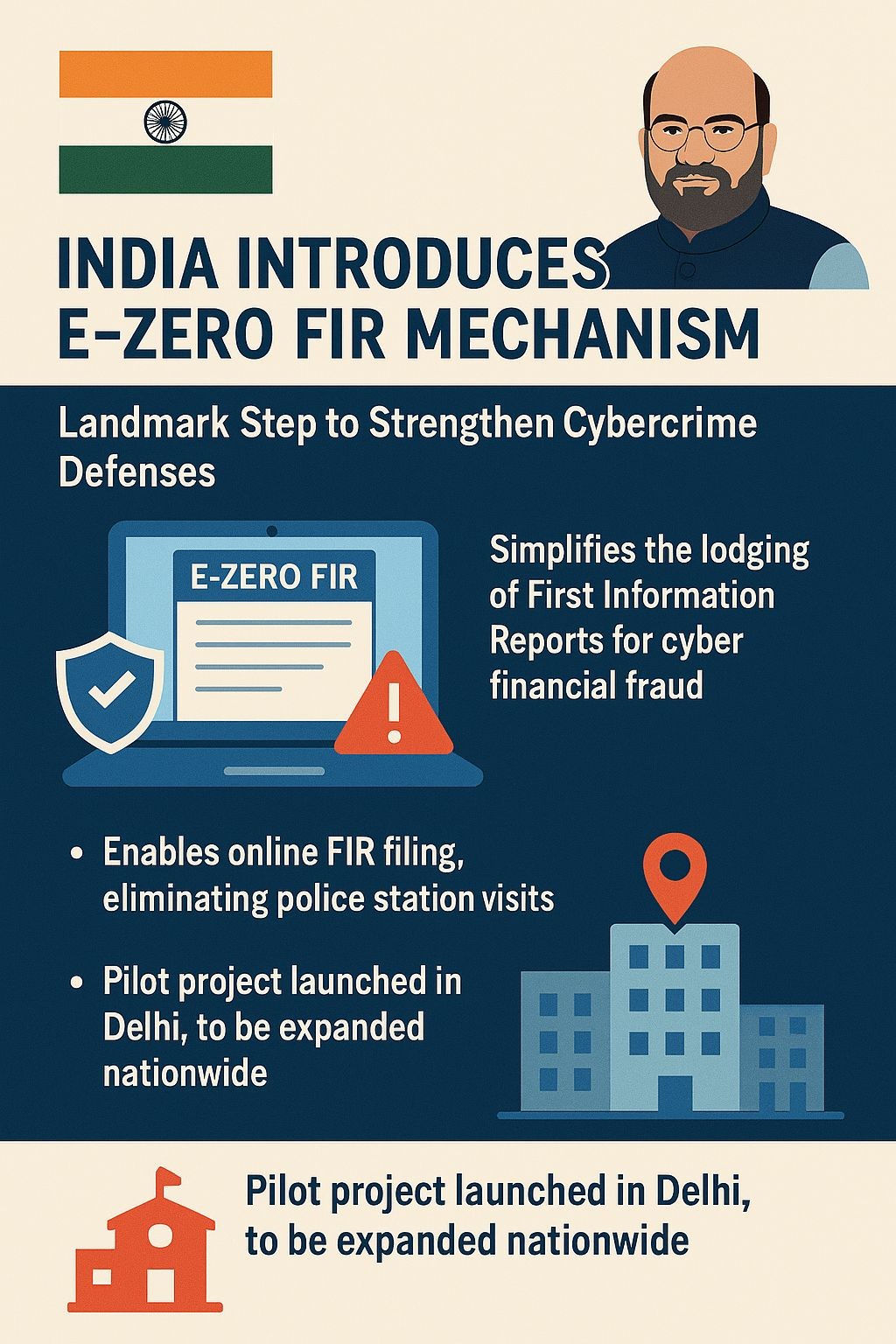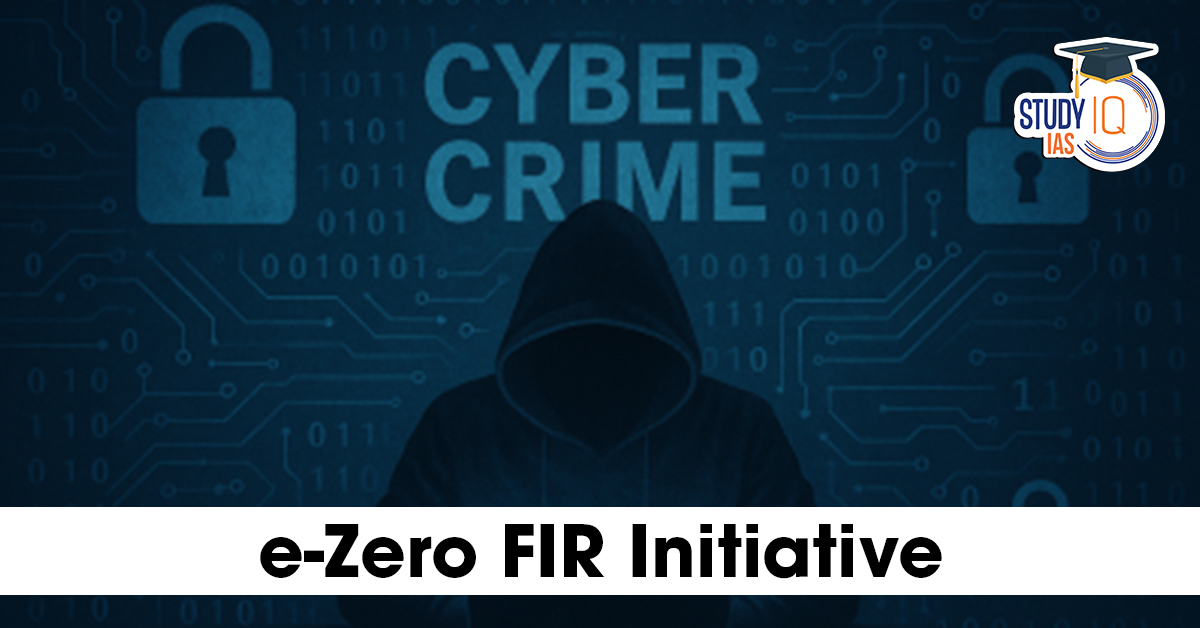Table of Contents
Context: The Union Home Minister launched the e-Zero FIR initiative in Delhi.
About e-Zero FIR Initiative
- e-Zero FIR Initiative is a new system to automatically convert financial cybercrime complaints (with a fraud value above Rs.10 lakh) into First Information Reports (FIRs).
- Complaints must be registered via the 1930 helpline or gov.in portal.
- Implemented by: Indian Cybercrime Coordination Centre (I4C)
Key Features
- No manual intervention required for FIR registration – fully automated.
- Reduces delays in filing FIRs, enabling faster investigations and response.
- Aims to tackle cyber financial frauds more effectively, especially those reported late.

Uses Integration of
- I4C’s National Cybercrime Reporting Portal
- Delhi Police’s e-FIR system
- National Crime Record Bureau’s Crime and Criminal Tracking Network and Systems (CCTNS)
Significance
- Supports victims of financial cybercrime in quickly initiating legal processes to recover lost funds.
- Enhances cybercrime tracking, data sharing, and investigative coordination across agencies.
- Critical step toward digital governance and justice delivery in cybercrime cases.
e-Zero FIR Initiative in India
India has introduced the e-Zero FIR mechanism as a landmark step to strengthen its cybercrime defenses. Unveiled by Union Home Minister Amit Shah within the Indian Cybercrime Coordination Centre (I4C), this digital platform harnesses modern technology to simplify the legal process for victims of online fraud.
Goal of e-Zero FIR
The primary goal of e-Zero FIR is to accelerate the lodging of First Information Reports for high-value cyber financial fraud. By enabling complainants to file FIRs online, it eliminates the need for repeated police station visits, reduces paperwork, and speeds up the initiation of investigations.
The initiative kicked off as a pilot project in Delhi, serving as a testbed to refine the system’s interface, security protocols, and user support. Insights gained from this phase will inform enhancements before the platform is expanded across all states and union territories, ensuring a robust, nationwide cybercrime reporting network.
e-Zero FIR Initiative: Overview
The Ministry of Home Affairs has unveiled the e-Zero FIR scheme as a fully digital mechanism to fast-track the registration of serious online fraud complaints. Any cyber financial scam that crosses a predefined monetary threshold is immediately converted into a First Information Report through an automated system. Union Home Minister Amit Shah inaugurated the pilot on May 19, 2025, in Delhi, marking the first step toward a paperless, rapid-response framework.
Through the National Cybercrime Reporting Portal (NCRP) and the 1930 helpline, victims can report frauds exceeding ₹10 lakh. Once a complaint meets this criterion, the platform instantly elevates it to a “Zero FIR” at Delhi’s e-Crime Police Station. This digital pipeline does away with manual intervention, ensuring that high-value cases enter the investigative workflow without delay.
Under the new Bharatiya Nagrik Suraksha Sanhita (BNSS), FIRs can be filed regardless of territorial boundaries. Victims no longer need to identify the precise police district where the offence took place, eliminating lengthy jurisdictional disputes. As a result, law enforcement is compelled to initiate inquiries promptly, rather than redirecting complainants across multiple stations.
Benefits for Victims and Law Enforcement
- Accelerates the initiation of investigations into major cyber financial misdemeanours
- Reduces physical visits to police stations, lightening administrative burdens
- Creates a unified digital record, aiding transparency and case monitoring
- Strengthens the government’s “Cyber-Secure Bharat” vision by leveraging technology
The Delhi trial will refine user interfaces, security protocols, and backend coordination among cybercrime units. Feedback from this phase will guide enhancements before the model is scaled to all states and union territories. Ultimately, e-Zero FIR aims to establish a cohesive, nationwide network for rapid cybercrime reporting and response.
Integrated Digital Ecosystem
e-Zero FIR relies on a suite of connected platforms to automate the entire reporting lifecycle:
- NCRP for online complaints
- Helpline 1930 for telephonic intake
- e-FIR system for automated registration
- Back-end dashboards for real-time case tracking
By weaving these tools together, the initiative empowers victims to lodge high-value cybercrime reports seamlessly and ensures police are mobilised without procedural lag.
Benefits of Automated FIR Registration
Streamlined Filing Process
By automating the creation of First Information Reports, victims no longer face multiple visits to police stations or piles of paperwork. The digital interface guides users step by step, ensuring that reports are lodged accurately on the first attempt. This clarity reduces errors and accelerates the overall reporting timeline.
Rapid Fraud Mitigation
Automation allows law enforcement to lock down suspicious transactions within minutes of a complaint. Instead of waiting days for manual approval, financial institutions receive FIR data in real time, enabling them to freeze accounts and prevent further losses. This swift response curbs the damage caused by high-value cyber fraud.
Enhanced Victim Accessibility
With an online platform, complainants can register FIRs from any location, at any hour. The system’s user-friendly design accommodates diverse literacy and technical skill levels, offering multilingual support and guided prompts. Victims feel empowered to report crimes without the stress of navigating complex bureaucratic channels.
Optimized Investigation Workflow
Once lodged, FIRs feed directly into a centralised cybercrime dashboard. Case assignments, status updates, and evidence uploads occur within a unified system, eliminating manual handovers between departments. Investigators gain immediate visibility into new cases, prioritising high-value offences and allocating resources more effectively.
Objectives and Strategic Relevance of the e-Zero FIR Initiative
Accelerating Investigations
The foremost aim of the e-Zero FIR system is to eliminate procedural bottlenecks in the registration of cybercrime complaints. Traditionally, delays in FIR registration can stall investigations, allowing perpetrators to siphon off stolen funds undetected. Under the new digital mechanism, qualifying complaints, especially high-value online financial fraud,s trigger the automatic generation of FIRs. This ensures that law enforcement agencies must immediately initiate the investigative process without discretionary delays, thereby preserving critical evidence and financial trails.
Ensuring Victim-Centric Justice
A key driver behind this initiative is the protection and empowerment of victims. Many complainants have previously faced jurisdictional confusion, red tape, or outright refusals when attempting to file FIRs. These hurdles often delay efforts to recover lost funds. By removing territorial constraints and automating the FIR registration process, e-Zero FIR ensures that victims’ grievances are promptly acknowledged and transformed into actionable police cases strengthening the possibility of recovering money before it’s irretrievably transferred or laundered.
Advancing India’s Cybersecurity Vision
This system is part of the government’s larger ambition to build a “Cyber Secure Bharat.” It marks a fundamental integration between digital citizen services (like the National Cybercrime Reporting Portal and helpline 1930) and the core policing infrastructure. According to Union Home Minister Amit Shah, e-Zero FIR is a proactive step toward enhancing India’s ability to trace and apprehend cybercriminals with unprecedented agility and efficiency.
Responding to Rising Cybercrime Trends
The initiative has been introduced in response to the alarming surge in cyber financial fraud in India. With over ₹36,000 crore in reported losses, and a dismal conviction rate, there is an urgent need for structural reform. By mandating automatic FIRs for complaints involving substantial financial damage, e-Zero FIR seeks to improve law enforcement accountability and enhance the likelihood of tracking and prosecuting cybercriminals. This could ultimately increase conviction rates and restore faith in the digital justice ecosystem.
In essence, e-Zero FIR isn’t just about digital convenience; it’s a strategic overhaul of how India tackles cybercrime. It improves speed, fairness, and operational efficiency while building a resilient framework that safeguards citizens and strengthens justice delivery in the cyber domain.
Implementation and Process of e-Zero FIR System
The e-Zero FIR initiative exemplifies digital integration between public reporting platforms and police infrastructure to accelerate cybercrime redressal.
Filing a Complaint
Victims of cyber financial fraud initiate the process by reporting the incident either online via the National Cybercrime Reporting Portal (NCRP) or by dialing the helpline number 1930. During this step, they submit essential details such as the nature of the scam, the mode of fraud, and the amount of financial loss.
Automated Threshold Check
Once the complaint is submitted, the system immediately checks if the monetary damage exceeds the ₹10 lakh threshold. If the reported loss qualifies, the case is automatically flagged for conversion into a formal FIR. This pre-screening stage filters high-value frauds for swift registration.
Generation of “Zero FIR”
Eligible complaints are digitally transformed into Zero FIRs, a special category of FIR that isn’t bound by jurisdiction. Under the new Bharatiya Nagrik Suraksha Sanhita (BNSS) law, crimes can be reported regardless of where they occurred. These FIRs are registered with the serial number “0,” signalling jurisdictional neutrality and immediate entry into the police records.
Case Routing via CCTNS
After registration, the system routes the Zero FIR through the Crime and Criminal Tracking Network & Systems (CCTNS) to the appropriate local cybercrime police station, based on the victim’s address or location. Although the FIR starts at Delhi’s e-Crime Police Station, the operational handling is transferred instantly to the relevant district police.
Victim Verification and Conversion
Finally, the complainant is informed and asked to visit the designated cybercrime unit within three days. There, they verify the details provided online or via call. The Zero FIR is then converted into a standard FIR, initiating the full-fledged investigation and legal proceedings.
National Cybersecurity Focus
The introduction of the e-Zero FIR platform marks a significant milestone in India’s effort to harden its cyberspace. It aligns with a comprehensive approach that includes policy frameworks, operational centres, and public–private partnerships to safeguard digital assets and critical infrastructure.
By automating high-value fraud reporting, the government is signalling its intent to move from reactive to proactive cyber defence, reducing response times and deterring potential attackers. This move dovetails with existing strategies like CERT-IN alerts, the upcoming National Cyber Security Strategy, and awareness drives across government bodies and industry. Collectively, these components work toward the vision of a unified, resilient “Cyber-Secure Bharat.”
Role of the Indian Cybercrime Coordination Centre (I4C)
The Indian Cybercrime Coordination Centre, housed within the Ministry of Home Affairs, serves as the nation’s central hub for cybercrime response and coordination. It brings together law enforcement agencies, digital forensics labs, and cybersecurity experts under one roof, ensuring seamless data sharing and unified action. Key functions of I4C include:
- Threat intelligence gathering and analysis to anticipate emerging cyber-attack patterns
- Capacity building and specialised training for police officers in digital investigations
- Oversight of a network of cyber forensic laboratories and incident response teams
- Public outreach campaigns on safe online practices and fraud prevention
- Collaboration with international bodies for cross-border cybercrime investigations
The e-Zero FIR initiative is a flagship programme in I4C’s portfolio, exemplifying its mission to streamline reporting, eliminate jurisdictional bottlenecks, and accelerate the justice process for victims of cyber fraud.
Future Plans of e-Zero FIR
India’s e-Zero FIR initiative, currently operating on a trial basis in Delhi, is poised for broader implementation across the country. As part of a nationwide digital reform, the government envisions scaling this technology-driven system to every state and union territory, reinforcing its commitment to cyber justice and security.
The pilot program is designed to refine the system’s processes, interface, and operational challenges. Lessons learned from Delhi’s deployment will inform enhancements before the platform is deployed countrywide. Future phases will involve integration with local law enforcement units, tailored regional onboarding, and public awareness drives.
The expansion complements India’s larger cybersecurity architecture, involving real-time threat monitoring, data protection laws, and capacity building for cybercrime units. Seamless coordination between platforms like NCRP, helpline 1930, CCTNS, and regional cyber cells will form a robust digital safety net.
With rising incidents of online financial scams, this initiative aims to bolster user trust in digital transactions and services.
- Faster reporting and response mechanisms reassure citizens that the government is equipped to protect their digital interests.
- A transparent and tech-enabled policing model aligns with the goal of a secure digital Bharat.


 Warring Couples Cannot Make Courts Their...
Warring Couples Cannot Make Courts Their...
 Tackling Child Trafficking in India: Leg...
Tackling Child Trafficking in India: Leg...
 In Overcrowded Prisons, Justice Has Lost...
In Overcrowded Prisons, Justice Has Lost...



















